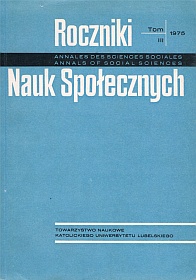Rozważania pastoralne o rodzinie
Abstrakt
The author discusses the pastoral problems of the family in the light of the documents of Vatican II. He shows that the family is a very important object of the pastorate. According to the author the pastorate means more than a set of goals and activities of the possessing the Sacrament of Priesthood. This concept includes all that Vatican II called „apostolate” and in particular „apostolate of the layman” which is based on the sacraments of Baptism, Confirmation and Matrimony. The clergy and laymen became members of Christ's priestly, prophetic and royal office and they participate in His triple mission of teaching, sacramentalization and governing. Matrimony — as a sacrament — means joining in the saving work of Christ and thus by its very nature has a pastoral character. Participation in the priesthood of Christ is realized in offering a „gift of the self” in matrimonial and family community. The family which tries to develop an authentic community of persons (coommunio personarum) through various „disinterested gilts of the self” for all its members shapes itself as the „royal priesthood”. This is inseparably connected with the royal mission (munus regale) which expresses itself in the attitude of self-control. Spiritual control characterized by „the royal freedom” and constant readiness to serve is the quintescence of all ethical requirements, without which an authentic community „communio personarium” is both unthinkable and impossible to realize. Along with this goes the participation in the prophetic mission of Christ — munus propheticum. The family is the first and basic community of God’s People which speaks for and gives evidence of God’s Kingdom. The family shapes the world in a most fundamental way, giving its members to the world. The idea of „consecratio mundii” finds its original and principal medium in family life.
The family should also be an object of the pastorate performed by the clergy according to the principal of assistance.
Copyright (c) 1975 Roczniki Nauk Społecznych

Utwór dostępny jest na licencji Creative Commons Uznanie autorstwa – Użycie niekomercyjne – Bez utworów zależnych 4.0 Międzynarodowe.


